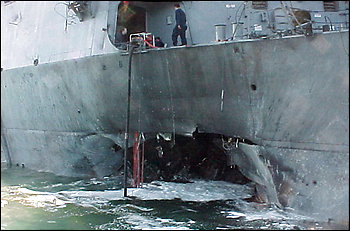
ADEN, Yemen — Almost eight years after al-Qaeda nearly sank the USS Cole with an explosives-stuffed motorboat, killing 17 sailors, all the defendants convicted in the attack have escaped from prison or been freed by Yemeni officials.
Jamal al-Badawi, a Yemeni who helped organize the plot to bomb the Cole as it refueled in this Yemeni port on Oct. 12, 2000, has broken out of prison twice. He was recaptured both times, but then secretly released by the government last fall. Yemeni authorities jailed him again after receiving complaints from Washington. But U.S. officials have so little faith that he’s still in his cell that they have demanded the right to perform random inspections.
Two suspects, described as the key organizers, were captured outside Yemen and are being held at Guantanamo Bay, Cuba, beyond the jurisdiction of U.S. courts. Many details of their alleged involvement remain classified. It is unclear when — or if — they will be tried by the military.
The collapse of the Cole investigation offers a revealing case study of the U.S. government’s failure to bring al-Qaeda operatives and their leaders to justice for some of the most devastating attacks on American targets over the past decade.
A week after the Cole bombing, President Bill Clinton vowed to hunt down the plotters and promised, “Justice will prevail.” In March 2002, President Bush said his administration was cooperating with Yemen to prevent it from becoming “a haven for terrorists.” He added: “Every terrorist must be made to live as an international fugitive with no place to settle or organize, no place to hide, no governments to hide behind and not even a safe place to sleep.”
Since then, Yemen has refused to extradite Badawi and an accomplice to the United States, where they have been indicted on murder charges. Other Cole conspirators have been freed after short prison terms. At least two went on to commit suicide attacks in Iraq.
“After we worked day and night to bring justice to the victims and prove that these Qaeda operatives were responsible, we’re back to square one,” said Ali Soufan, a former FBI agent and a lead investigator into the bombing. “Do they have laws over there or not? It’s really frustrating what’s happening.”
To this day, al-Qaeda trumpets the attack on the Cole as one of its greatest military victories. It remains an improbable story: how two suicide bombers smiled and waved to unsuspecting U.S. sailors in Aden’s harbor as they pulled their tiny fishing boat alongside the $1 billion destroyer and blew a gaping hole in its side.
Read moreProbe of USS Cole Bombing Unravels



